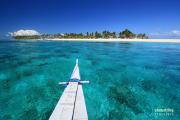Physical Settings
The Philippines is a beautiful tropical country in Southeast Asia, located between Taiwan and Borneo. It is comprised of 7,107 islands which are divided into three groups: Luzon, the largest island where Manila, the capital of the Philippines, is situated; Visayas, known for its sunny beaches and scenic coves; and Mindanao, whose striking forests make it an irresistible haven for nature lovers.

Mount Mayon - Albay
(perfect cone)
Islands in the Philippines are uneven lands composed of many mountain ranges, far-reaching but narrow coastal lands, fertile valleys, rich agricultural plains, traversable rivers, and beautiful lakes and waterfalls. Volcanoes can also be found in this country and a few of them are active. Of these, Mayon is the most famous because of its almost perfect cone that rises above its surrounding landscape. Philippines has a lot of fascinating scenery and tourist spots that hugely appeal to foreign and local travelers alike. One example of a great travel destination is the Puerto Princesa Underground River which is recently included in the New Seven Wonders of Nature.

Puerto Princesa Underground River - Puerto Princesa, Palawan
(one of the New7Wonders of Nature)
The Philippine coastline is considered as the longest discontinuous coastline in the world, thus allowing the country to have a very diverse marine life and aquatic resources. The different bodies of water surrounding the Philippines are great venues for tourists to do exciting activities like snorkelling, surfing, and scuba diving.
Climate in the Philippines is a tropical rainforest climate, characterized by high temperature and high humidity. Rainfall can be expected throughout the year, although it is more abundant from June to October. November to February is cool and dry while March to May is hot and dry.
Culture
When it comes to the Philippine society, this country is known for its cultural diversity. Anthropologists have studied that today’s Filipino culture is greatly influenced by the influx of foreign colonization and trades throughout history. Nowadays, the nation is also exposed to other countries’ culture and traditions, thus incorporating their way of life into its own. As a result, Filipinos have a rather unique cultural mosaic – a blend of outside influences and their own Filipino style.
There are 11 languages and 87 dialects in the Philippine archipelago. The national language is Filipino, which is based primarily on the Tagalog language. Most Filipinos are bilingual, with English as the basic language in government, higher education, and commerce.

St. Augustine Church (Paoay Church) - Paoay, Ilocos Norte
(One of the most famous and oldest churches in the Philippines)
Religion in the Philippines is predominantly Catholic, encompassing more than 86 percent of the whole population. Eight percent of the masses belong to different nationalized Christian cults and Protestant denominations. There is a 4 percent Muslim minority concentrated on the Southern end of the country. The remaining 2 percent are scattered in isolated mountainous regions, following indigenous beliefs and practices.
People
The family is said to be the building block of the Philippine society. Filipinos have close family ties which extends to a great circle of relatives, usually including third cousins. Their sense of kinship is very strong and neighbors can usually be traced as distant family relations.
Filipinos are generally known as hospitable people. Visitors may come without notice and they will still be accommodated and entertained. Filipinos sincerely believe that serving others in the best way possible will earn them honor and friendship.

Masskara Festival at Bacolod City
Resilience and optimism are also admirable characteristics of Filipinos. They still wear huge smiles even when floods and disasters break their homes apart. They can still afford to celebrate even with the struggling economy, political chaos, and growing poverty in the country. Laughing and joking in the face of adversity is their way to feel relief, ease their burdens, and see things in a more positive light.
----
The Philippines is totally blessed with a breathtaking environment and kind people, thus putting it to the centerstage of tourism and gaining momentum as a world-class travel destination.










